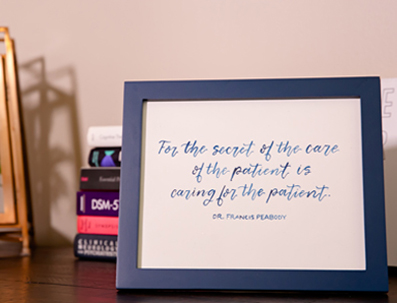Our diverse team offers various programs that assist our clients in tangible ways. Our holistic approach to mental healthcare and ethical core values allow our clients to be courageous, resilient, and resourceful. As we change the landscape of mental health care, we tailor our clients treatment to their personal experiences.
Our programs include:
Psychiatric Rehabilitation Program
Mental Health Counseling (Individual, Couple, & Family)
Psychiatry
Outpatient Programs (Intensive and Supportive)
Substance Abuse Counseling
As our client, we see your greatest potential and we want you to thrive. We will celebrate your success and share empathy during your difficult times. Wherever you are in your wellness journey– be reminded that you are not alone, you deserve compassionate care, and a plan for long-term healing.
Below, we have a provided and easy-to-use guide on the different types of therapy you can seek as a client here:


Cognitive Behavioral Therapy (CBT)
Cognitive Behavioral Therapy (CBT) is based on the concept that all your thoughts, emotions, physical sensations are interconnected and therefore negatively impact your psyche. CBT aims to improve your cognitive distortions and behaviors by through emotional regulation and coping strategies.
Most commonly used to treat: depression, anxiety disorders, alcohol and drug addiction, and eating disorders.

Person-Centered Therapy
Person-centered therapy is a non-authoritative approach to therapy that encourages the client to take the lead during conversation therefore letting them discover their own solutions. During person-centered therapy, the therapist listens without judgement and interruption allowing for self-discovery.
Most commonly used to treat: depression, anxiety disorders, self-confidence issues, and trauma relating to abuse.

Psycho-Dynamic Therapy
Psycho-dynamic therapy is another type of intensive talk therapy that deals with subjective experience in ways that other therapies sometimes do not. Psycho-dynamic therapy focuses less on the client’s relationship with their therapist, but more on the client’s relationship with their external world. This therapy is often shorter due to it’s frequency.
Most commonly used to treat: depression, suicidal idealizations, addiction, and social anxiety.

Motivational Interviewing
Motivational interviewing is a counseling method that helps people resolve ambivalent feelings and insecurities to find the internal motivation they need to change their behavior. This intervention helps people become motivated to change the behaviors that are preventing them from making healthier choices. It can also prepare individuals for further, more specific types of therapies.
Most commonly used to treat: depression, addiction, and eating disorders.

Mindfulness-Based Therapy
Mindfulness-Based Cognitive Therapy (MBCT) is a modified form of cognitive therapy that incorporates mindfulness practices such as meditation and breathing exercises. MBCT was developed for people with recurring episodes of depression or unhappiness, to prevent relapse.
Most commonly used to treat: chronic depression, anxiety disorders, and addiction.

Rational Emotive Behavior Therapy (REBT)
REBT assists recovering individuals in better understanding their thoughts. This leads to them thinking in more positive ways and better processing their emotions.
Most commonly used to treat: addiction.

